牛津译林八年级下现在完成时学案
2023年江苏中考英语牛津译林版现在完成时精讲 学案
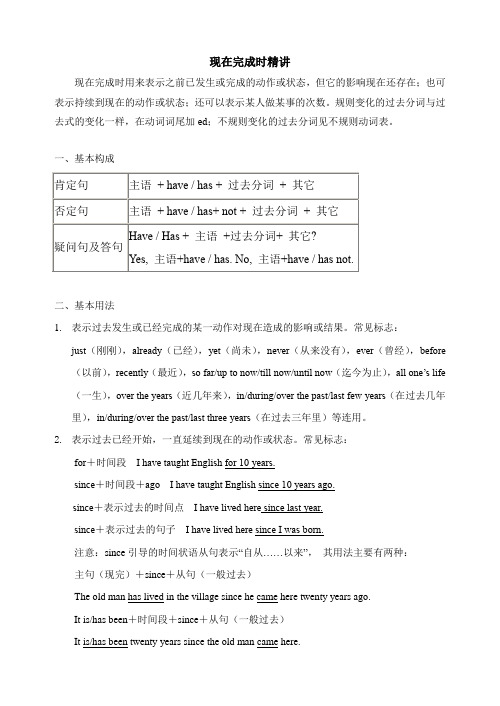
现在完成时精讲现在完成时用来表示之前已发生或完成的动作或状态,但它的影响现在还存在;也可表示持续到现在的动作或状态;还可以表示某人做某事的次数。
规则变化的过去分词与过去式的变化一样,在动词词尾加ed;不规则变化的过去分词见不规则动词表。
一、基本构成二、基本用法1.表示过去发生或已经完成的某一动作对现在造成的影响或结果。
常见标志:just(刚刚),already(已经),yet(尚未),never(从来没有),ever(曾经),before (以前),recently(最近),so far/up to now/till now/until now(迄今为止),all one’s life (一生),over the years(近几年来),in/during/over the past/last few years(在过去几年里),in/during/over the past/last three years(在过去三年里)等连用。
2.表示过去已经开始,一直延续到现在的动作或状态。
常见标志:for+时间段I have taught English for 10 years.since+时间段+ago I have taught English since 10 years ago.since+表示过去的时间点I have lived here since last year.since+表示过去的句子I have lived here since I was born.注意:since引导的时间状语从句表示“自从……以来”,其用法主要有两种:主句(现完)+since+从句(一般过去)The old man has lived in the village since he came here twenty years ago.It is/has been+时间段+since+从句(一般过去)It is/has been twenty years since the old man came here.3.表示某人经历某事的次数。
八下牛津译林英语全册教案

八下牛津译林英语全册教案一、教学内容本节课选自八下牛津译林英语全册,主要围绕第一单元“Past and Present”展开,具体内容包括:1. 教材章节:Unit 1 Past and Present2. 详细内容:Grammar:Present Perfect Tense;Vocabulary:changes,memory,remain,while,eventually;Reading:Changes in Hometown;Listening & Speaking:Talk about changes二、教学目标1. 让学生掌握现在完成时的用法,并能运用到实际情景中。
2. 帮助学生扩充与变化相关的词汇,如:changes,memory,remain,while,eventually。
3. 提高学生的阅读理解能力,通过阅读了解家乡的变化。
三、教学难点与重点1. 教学难点:现在完成时的构成和用法,特别是与一般过去时的区别。
2. 教学重点:词汇的积累和运用,以及阅读理解能力的培养。
四、教具与学具准备1. 教具:PPT,黑板,录音机,磁带。
2. 学具:课本,练习册,字典。
五、教学过程1. 导入:通过展示一组家乡过去和现在的照片,引发学生对变化的思考,导入新课。
2. 新课内容呈现:a. 通过PPT展示现在完成时的结构,解释其用法。
b. 引导学生用现在完成时描述照片中的变化。
c. 学习与变化相关的词汇,如:changes,memory,remain,while,eventually。
3. 阅读环节:a. 学生自主阅读“Changes in Hometown”。
b. 教师提问,检查学生对文章的理解。
c. 讨论文章中提到的变化,让学生用现在完成时进行描述。
4. 听力环节:a. 听录音,完成相关练习。
b. 学生分角色扮演,模拟对话。
5. 课堂练习:a. 完成练习册中的相关练习。
b. 学生互相提问,用现在完成时描述对方的变化。
2023年牛津译林版八年级英语下册Unit 1教案
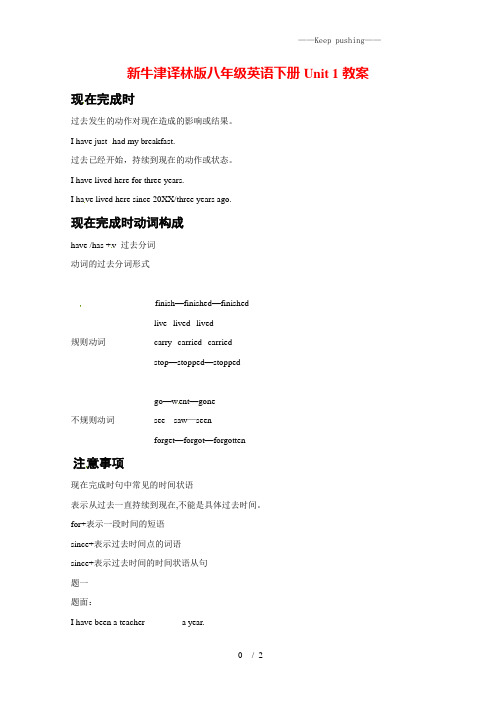
新牛津译林版八年级英语下册Unit 1教案现在完成时过去发生的动作对现在造成的影响或结果。
I have just had my breakfast.过去已经开始,持续到现在的动作或状态。
I have lived here for three years.I ha ve lived here since 20XX/three years ago.现在完成时动词构成have /has +v 过去分词动词的过去分词形式finish—finished—finishedlive--lived--lived规则动词carry--carried--carriedstop—stopped—stoppedgo—went—gone不规则动词see---saw—seenforget—forgot—forgotten注意事项现在完成时句中常见的时间状语表示从过去一直持续到现在,不能是具体过去时间。
for+表示一段时间的短语since+表示过去时间点的词语since+表示过去时间的时间状语从句题一题面:I have been a teacher ______ a year.He has been at this school _______ 1992.We have learned 1,000 English words _______ we came to this school.有just, already, yet, before/ ever, never此类副词时,常强调动作完成,不强调动作的持续.题二题面:Have you _____been to Japan?I have _____ finished my homework.I have finished my homework ______.I haven’t finished my homework ____.讲义参考答案题一答案:for;since;since题二答案:ever;already/just;already;yet教师的职务是‘千教万教,教人求真’;学生的职务是‘千学万学,学做真人’。
牛津译林版八年级英语下册:现在完成时讲解和练习(有答案)
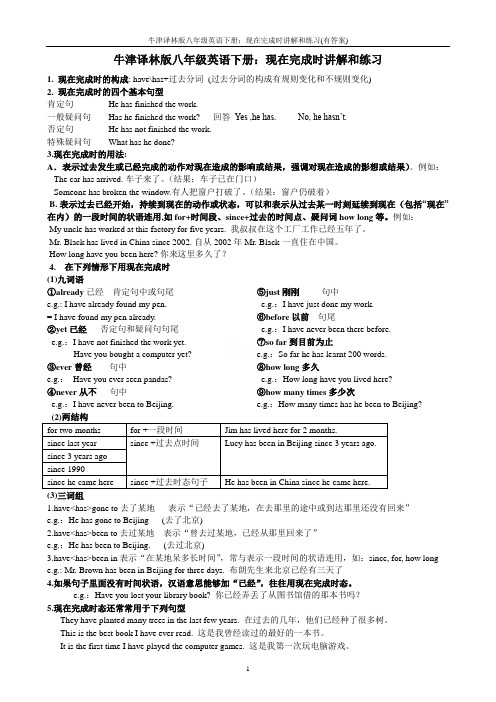
牛津译林版八年级英语下册:现在完成时讲解和练习1. 现在完成时的构成: have\has+过去分词(过去分词的构成有规则变化和不规则变化)2. 现在完成时的四个基本句型肯定句He has finished the work.一般疑问句Has he finished the work? 回答Yes ,he has. No, he hasn’t.否定句He has not finished the work.特殊疑问句What has he done?3.现在完成时的用法:A.表示过去发生或已经完成的动作对现在造成的影响或结果,强调对现在造成的影想或结果)。
例如:The car has arrived. 车子来了。
(结果:车子已在门口)Someone has broken the window.有人把窗户打破了。
(结果:窗户仍破着)B. 表示过去已经开始,持续到现在的动作或状态,可以和表示从过去某一时刻延续到现在(包括“现在”在内)的一段时间的状语连用,如for+时间段、since+过去的时间点、疑问词how long等。
例如:My uncle has worked at this factory for five years. 我叔叔在这个工厂工作已经五年了。
Mr. Black has lived in China since 2002. 自从2002年Mr. Black 一直住在中国。
How long have you been here? 你来这里多久了?4. 在下列情形下用现在完成时(1)九词语①already已经肯定句中或句尾e.g.: I have already found my pen.= I have found my pen already.②yet已经否定句和疑问句句尾e.g.:I have not finished the work yet.Have you bought a computer yet?③ever曾经句中e.g.:Have you ever seen pandas?④never从不句中e.g.:I have never been to Beijing. ⑤just刚刚句中e.g.:I have just done my work.⑥before以前句尾e.g.:I have never been there before.⑦so far到目前为止e.g.:So far he has learnt 200 words.⑧how long多久e.g.:How long have you lived here?⑨how many times多少次e.g.:How many times has he been to Beijing?(3)三词组1.have<has>gone to去了某地表示“已经去了某地,在去那里的途中或到达那里还没有回来”e.g.:He has gone to Beijing (去了北京)2.have<has>been to去过某地表示“曾去过某地,已经从那里回来了”e.g.:He has been to Beijing. (去过北京)3.have<has>been in 表示“在某地呆多长时间”,常与表示一段时间的状语连用,如:since, for, how longe.g.: Mr. Brown has been in Beijing for three days. 布朗先生来北京已经有三天了4.如果句子里面没有时间状语,汉语意思能够加“已经”,往往用现在完成时态。
牛津译林版8B现在完成时学案(无答案)
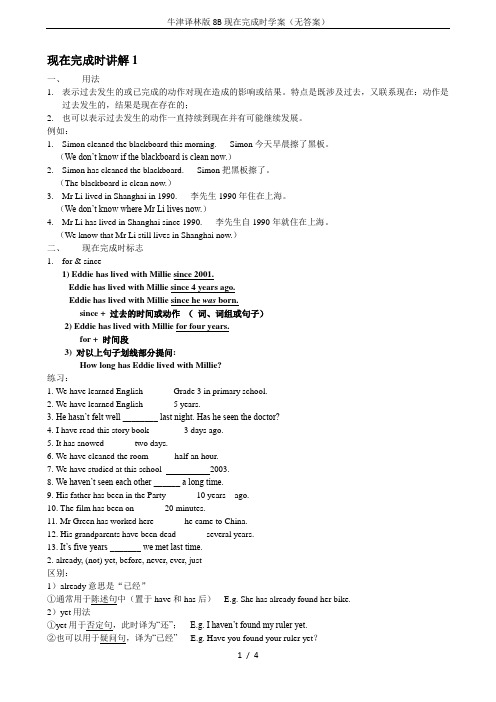
现在完成时讲解1一、用法1.表示过去发生的或已完成的动作对现在造成的影响或结果。
特点是既涉及过去,又联系现在:动作是过去发生的,结果是现在存在的;2.也可以表示过去发生的动作一直持续到现在并有可能继续发展。
例如:1.Simon cleaned the blackboard this morning. Simon今天早晨擦了黑板。
(We don’t know if the blackboard is clean now.)2.Simon has cleaned the blackboard. Simon把黑板擦了。
(The blackboard is clean now.)3.Mr Li lived in Shanghai in 1990. 李先生1990年住在上海。
(We don’t know where Mr Li lives now.)4.Mr Li has lived in Shanghai since 1990. 李先生自1990年就住在上海。
(We know that Mr Li still lives in Shanghai now.)二、现在完成时标志1.for & since1) Eddie has lived with Millie since 2001.Eddie has lived with Millie since 4 years ago.Eddie has lived with Millie since he was born.since + 过去的时间或动作(词、词组或句子)2)Eddie has lived with Millie for four years.for + 时间段3) 对以上句子划线部分提问:How long has Eddie lived with Millie?练习:1. We have learned English ______ Grade 3 in primary school.2. We have learned English ______ 5 years.3. He hasn’t felt well ________ last night. Has he seen the doctor?4. I have read this story book _______ 3 days ago.5. It has snowed ______ two days.6. We have cleaned the room _____ half an hour.7. We have studied at this school 2003.8. We haven’t seen each other ______ a long time.9. His father has been in the Party ______ 10 years ago.10. The film has been on ______ 20 minutes.11. Mr Green has worked here ______ he came to China.12. His grandparents have been dead ______ several years.13. It’s five years _______ we met last time.2. already, (not) yet, before, never, ever, just区别:1)already意思是“已经”①通常用于陈述句中(置于have和has后) E.g. She has already found her bike.2)yet用法①yet用于否定句,此时译为“还”; E.g. I haven’t found my ruler yet.②也可以用于疑问句,译为“已经” E.g. Have you found your ruler yet?3)just主要用于肯定的陈述句中,(置于have和has后),意思是“刚才” E.g. I have just bought a new book. 4)never用于句子里表示否定,译为“从不” E.g. I’ve never seen a UFO.5)ever用于疑问句中译为“曾经” E.g. Have you ever seen a UFO?This is the best movie I’ve ever seen. = I’ve never seen such a good movie before.6)before 用于句末,译为“以前” E.g. I’ve never seen him before. // Have you seen him before?P.S.: 1. aleady用于肯定,在否定和疑问句中变成yet,位于句末2. just 用现在完成时,但是just now = a moment ago,用过去时3.so far, up to now, until/till now, by this time, in the recent years, in/over the past few years, recently练习1:1.The boy has already gone home . (否定句)2. The girl has not come back yet.(肯定句)3.They have already visited China. (一般疑问句)4.—I 've ________finished my homework. ---Have you finished your homework_______? —No, not________.A. yet; already; yetB. already; yet; alreadyC. yet; already; alreadyD. already; yet; yet5. --Have you returned the book to the library ________? --Yes, I have _______ returned it.A. yet, yetB. already, alreadyC. already, yetD. yet, already练习2:1 Have you done your homework ________ ? ( for, just, yet)2 I have _________ been to Chengdu. ( for, never, yet)3 He has worked there _________ he left school. (already, just, since)4 She has known Sam __________ nine years. ( for, never, since)5 Have you __________ ridden a horse? ( ever, for, yet)6 They have __________ arrived. (ever, just, yet)7 He has__________ washed the dished. ( already, ever, for)8 We have not completed the project _________ . ( already, for, yet)练习3:1. He ___________ (wait) for an hour.2. I _______________(not finish) the work yet.3. __________ you _________ (know) him since then?4. I ___________ (not hear) from my brother for a long time.5. We ___________ (be) there many times since 3 years ago.6. How long __________ you __________ (stay) at home already?7. He ___________ (not read) the book before.8. Her sister ___________ (go) to Changchun. She________ (leave) this morning.9. He ___________ (live) in his hometown since he left here.10. The writer ____________ (finish) several story-books since 1990.11 She __________ (wait) for two hours already.12 They _______________(not finish) the project yet.13 _________ you _________ (hear) from my sister recently?14 Mark __________ (be) there for two days.15 _________ they ever _________ (stay) at home alone?16 I __________ never ___________ (watch) this film .17 Daniel __________ just __________ (arrive) home.18 We _____________(not eat) anything since then.练习4:Completing the following sentences1 我认识这位作家有五年了。
牛津译林版八年级英语下册 Unit 1 Past and Present Grammar教案
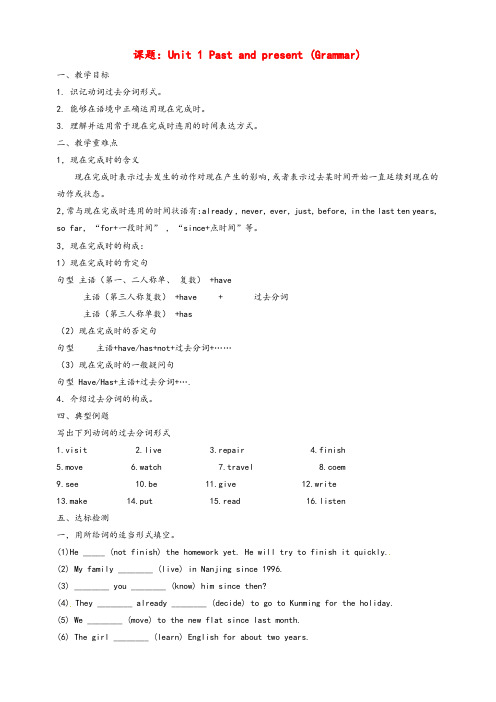
课题:Unit 1 Past and present (Grammar)一、教学目标1. 识记动词过去分词形式。
2. 能够在语境中正确运用现在完成时。
3. 理解并运用常于现在完成时连用的时间表达方式。
二、教学重难点1,现在完成时的含义现在完成时表示过去发生的动作对现在产生的影响,或者表示过去某时间开始一直延续到现在的动作或状态。
2,常与现在完成时连用的时间状语有:already , never, ever, just, before, in the last ten years, so far, “for+一段时间” , “since+点时间”等。
3,现在完成时的构成:1)现在完成时的肯定句句型主语(第一、二人称单、复数) +have主语(第三人称复数) +have + 过去分词主语(第三人称单数) +has(2)现在完成时的否定句句型主语+have/has+not+过去分词+……(3)现在完成时的一般疑问句句型 Have/Has+主语+过去分词+….4.介绍过去分词的构成。
四、典型例题写出下列动词的过去分词形式1.visit2.live3.repair4.finish5.move6.watch7.travel8.coem9.see 10.be 11.give 12.write13.make 14.put 15.read 16.listen五、达标检测一,用所给词的适当形式填空。
(1)He _____ (not finish) the homework yet. He will try to finish it quickly.(2) My family ________ (live) in Nanjing since 1996.(3) ________ you ________ (know) him since then?(4) They ________ already ________ (decide) to go to Kunming for the holiday.(5) We ________ (move) to the new flat since last month.(6) The girl ________ (learn) English for about two years.(7) My father went to Beijing two weeks ago. I ________ (not see) him since then.(8) ________ Tom ________ (write) letters to you recently?(9) Jack's mother isn't at home. She ________ (go) to the supermarket.(10) The film ________ (be) on for abou t 20 minutes. We missed the beginning.二,选择填空( )1. I have finished my homework ____. Have you finished your homework ____?A.yet, yetB. yet, alreadyC. already, yetD. already, already( )2. I haven’t s een Kate ____ 4 months.A. AlreadyB. sinceC. forD. yet( )3. He has ___ seen the film Harry Potter. So he knows nothing about it. A. already B. ever C. never D. yet( )4. She has been ill in bed ____ two days ago.A. sinceB. inC. duringD. for( )5. ---Have you seen him ____?--- No, I haven’t.A. al readyB. neverC. everD. recently( )6. I have ____ watched a wonderful film. It’s really interesting.三,句型转换1.They’ve already read the book.(改为否定句、一般疑问句、并作肯定和否定回答)________________________________________________________________________________________________________________________________________________________2.Daniel has stayed in Shanghai for two days.(对画线部分提问)____________________________________________________3.I got to know him ten years ago.(改为同义句)_______________________________________________4.Sandy got to Beijing half an hour ago.( 改为同义句)______________________________________________________。
牛津译林版英语八下_Units 1-3 现在完成时语法讲解和练习
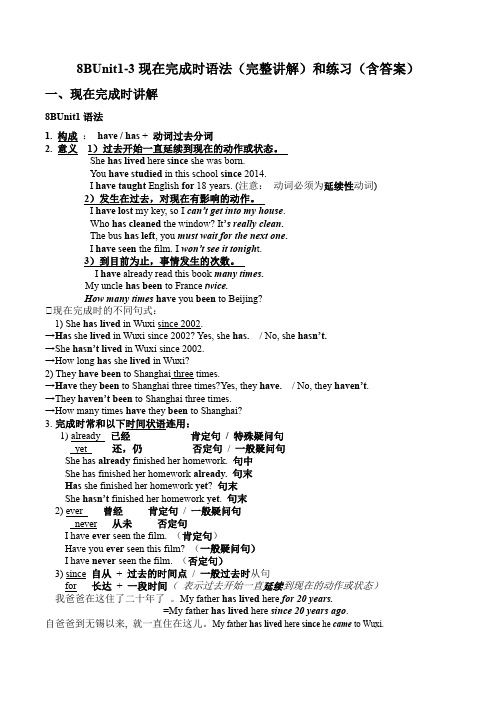
8BUnit1-3现在完成时语法(完整讲解)和练习(含答案)一、现在完成时讲解8BUnit1语法1. 构成:have / has + 动词过去分词2. 意义1)过去开始一直延续到现在的动作或状态。
She has lived here since she was born.You have studied in this school since 2014.I have taught English for 18 years. (注意:动词必须为延续性动词)2)发生在过去,对现在有影响的动作。
I have lost my key, so I can’t get into my house.Who has cleaned the window? It’s really clean.The bus has left, you must wait for the next one.I have seen the film. I won’t see it tonigh t.3)到目前为止,事情发生的次数。
I have already read this book many times.My uncle has been to France twice.How many times have you been to Beijing?★现在完成时的不同句式:1) She has lived in Wuxi since 2002.→Has she lived in Wuxi since 2002? Yes, she has./ No, she hasn’t.→She hasn’t lived in Wuxi since 2002.→How long has she lived in Wuxi?2) They have been to Shanghai three times.→Have they been to Shanghai three times?Yes, they have./ No, they haven’t.→They haven’t been to Shanghai three times.→How many times have they been to Shanghai?3.完成时常和以下时间状语连用:1)already 已经肯定句/ 特殊疑问句yet 还,仍否定句/ 一般疑问句She has already finished her homework. 句中She has finished her homework already.句末Has she finished her homework yet? 句末She hasn’t finished her homework yet. 句末2) ever 曾经肯定句/ 一般疑问句never 从未否定句I have ever seen the film. (肯定句)Have you ever seen this film? (一般疑问句)I have never seen the film. (否定句)3) since 自从+ 过去的时间点/ 一般过去时从句for 长达+ 一段时间(表示过去开始一直延续到现在的动作或状态)我爸爸在这住了二十年了。
牛津译林八年级下现在完成时学案
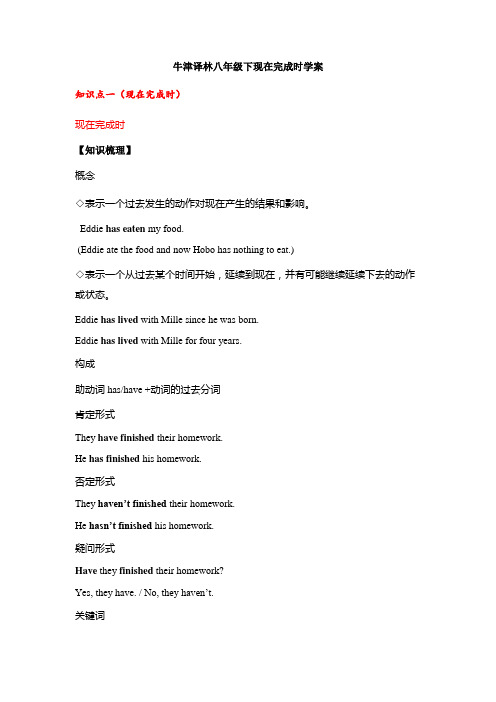
牛津译林八年级下现在完成时学案知识点一(现在完成时)现在完成时【知识梳理】概念◇表示一个过去发生的动作对现在产生的结果和影响。
Eddie has eaten my food.(Eddie ate the food and now Hobo has nothing to eat.)◇表示一个从过去某个时间开始,延续到现在,并有可能继续延续下去的动作或状态。
Eddie has lived with Mille since he was born.Eddie has lived with Mille for four years.构成助动词has/have +动词的过去分词肯定形式They have finished their homework.He has finished his homework.否定形式They haven’t finished their homework.He hasn’t finished his homework.疑问形式Have they finished their homework?Yes, they have. / No, they haven’t.关键词already(用于肯定句), yet(用于否定句和疑问句), since+一点时间, for+一段时间, never, ever, three times(其它表示频率的词, once, twice等)before, recently, in the past/last few years, so far, this month, today, now【例题精讲】1.()Julia isn’t going to the cinema with us because she ______ the film.A. seesB. sawC. will seeD. has seen解析:考查现在完成时对目前造成影响的用法。
- 1、下载文档前请自行甄别文档内容的完整性,平台不提供额外的编辑、内容补充、找答案等附加服务。
- 2、"仅部分预览"的文档,不可在线预览部分如存在完整性等问题,可反馈申请退款(可完整预览的文档不适用该条件!)。
- 3、如文档侵犯您的权益,请联系客服反馈,我们会尽快为您处理(人工客服工作时间:9:00-18:30)。
牛津译林八年级下现在完成时学案知识点一(现在完成时)现在完成时【知识梳理】概念◇表示一个过去发生的动作对现在产生的结果和影响。
Eddie has eaten my food.(Eddie ate the food and now Hobo has nothing to eat.)◇表示一个从过去某个时间开始,延续到现在,并有可能继续延续下去的动作或状态。
Eddie has lived with Mille since he was born.Eddie has lived with Mille for four years.构成助动词has/have +动词的过去分词肯定形式They have finished their homework.He has finished his homework.否定形式They haven’t finished their homework.He hasn’t finished his homework.疑问形式Have they finished their homework?Yes, they have. / No, they haven’t.关键词already(用于肯定句), yet(用于否定句和疑问句), since+一点时间, for+一段时间, never, ever, three times(其它表示频率的词, once, twice等)before, recently, in the past/last few years, so far, this month, today, now【例题精讲】1.()Julia isn’t going to the cinema with us because she ______ the film.A. seesB. sawC. will seeD. has seen解析:考查现在完成时对目前造成影响的用法。
Key:D2.()-- Look at these stamps. I _______ them for five years-- Wow, they are wonderful.A. keptB. have keptC. have boughtD.bought解析:for是现在完成时的标志词,for+一段时间,动词具有延续性。
Key:B【知识梳理】already与yet用法区别already 用于肯定句,一般放在助动词与过去分词之间。
yet用于否定句和疑问句,一般置于句末。
【例题精讲】I have already worked out this math problem? (改为否定句)I worked out the math problem .解析:already与yet的转换.Key : have not; yet【知识梳理】since 和for用法区别(1)since的用法①since 后面加点时间,如since nearly three years ago或since2008。
②since引导时间状语从句时,后面的时间状语从句动词用一般过去时。
(2)for的用法:for后加一段时间。
since/for 可以通过ago进行同义句转换。
since+时间+ago=for +时间【例题精讲】1.They have worked in the factory since ten months ago.= They have worked in the factory for ten years2.We have learned English for nearly three years. =We have learned English since three years ago.【巩固练习】I have had a cold _______ last Saturday, I have had a cold ______ 5 days.= I havehad a cold ______ 5 days ago.Key :since,for, sinceI haven’t seen you _____ last Friday.A. forB. sinceC. fromD. on解析:后面的last Friday 是具体时间点,所以应该用since,选B。
这里需要提醒学生虽然此题后面的last是一般过去时的时间标志,但是跟since 连用之后要用现在完成时。
Key :B【知识梳理】动词的过去分词的用法Regular verbs Irregular verbsBase form Past participle Base form Past participlevisit visited hit hitrepair repaired put putlive lived meet metmove moved make madetry tried sell soldstudy studied give givenfit fitted write written规则动词的过去分词的构成1.大多数的动词的过去分词是规则的,只需在动词后加-ed;例如:work→worked listen→listened jump→jumped visit→visited2.在以-e结尾的动词后只加-d;例如:close→closed like→liked agree→agreed move→moved3.在以辅音字母加y结尾的动词,应将y改为i再加ed;例如:study→studied carry→carried try→tried worry→worried4.以重读闭音节结尾的动词,要双写末尾的辅音字母再加-ed;例如:stop→stopped drop→dropped不规则动词的过去分词的构成1. 有些动词的原形和过去分词相同;例如:put→put hurt→hurt become→become run→run 2.改变单词中间元音字母;例如:sit→sat win→won hold→held3.把单词结尾的字母d改为t;例如:lend→lent spend→spent send→sent4.以eep结尾的动词,把eep改为ept;例如:keep→kept sleep→slept5. 过去分词以aught或ought结尾;例如:teach→taught buy→bought6.以ay结尾的动词,把ay变成aid;例如:say→said pay→paid7.在原形词尾加n或en;例如:give→given eat→eaten【例题精讲】写出下列动词的过去分词1.be___________________ 2.find______________________ 3.begin_________________ 4.forget___________________ 5.bring_________________ 6.leave____________________ 7.draw_________________ 8.work____________________ Keys:been; found; begun; forgotten; brought; left; drew; worked知识点二现在完成时语法补充【知识梳理】have/ has been to, have/ has gone to, have/ has been in的区别1.have/ has been to:曾经去过,强调以往的经历。
如:The old man has been to Egypt when he was young.2.have/ has gone to:去了某地,强调还没有回来。
如:---Where is your uncle? --- He has gone to the supermarket.3.have/ has been in:待在某地,住在某地。
如:【例题精讲】用have(has) been 或have(has) gone 填空。
A: Where ____________ Li Fei ___________?B: He ____________ to Hainan Island.A: How long ___________ he ___________ there?B: He _____________ there for three days.A: When will he come back, do you know?B: I’m afraid he won’t come back recently.A: Could you tell me the way to Hainan Island?B: Sorry, I _________ never ___________ there.A: How many times ___________ Li Fei __________ to that place?B: He _____________ there only once.答案: has, gone , has gone, has, been, has been ,have ,been , has ,been, has been【知识梳理】延续性动词和非延续性动词的用法(1)现在完成时与一段时间连用时应注意句中的谓语动词必须是延续性动词,非延续性动词不能和一段时间连用。
如:翻译:这本书我从图书馆已经借了两个多星期了。
误:I have already borrowed the book for over two weeks.正:I have already kept the book for over two weeks.(2)非延续性动词与一段时间状语连用时可采用将非延续性动词转化为延续性动词的方式。
如:come—be here;go—be there; die--be dead; borrow--keep; buy--have; join--be in(be a member);leave--be away等。
间连用。
【例题精讲】--Do you miss your parents far away?--Yes, very much. They the hometown for over two years.A.leftB. have leftC. were away fromD. have been away from 解析: 考查动词的时态。
从句中的for over two years 可知谓语动词是现在完成时表示时间段的延续动词。
